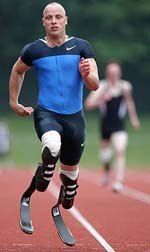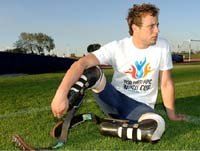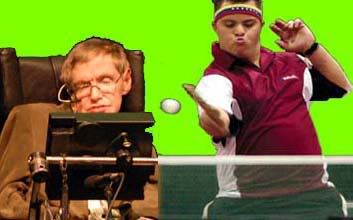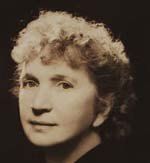
The victory of Oscar Pistorius in the 100 metres at the Paralympic Games in Beijing yesterday was a triumphal performance by an athlete at the top of his game. It is raising a lot of questions about enhancement in sport that have implications for the meaning of disability as a whole.
Pistorius, who
 se lower legs were amputated as a baby because he was born without fibulas, originally applied to represent South Africa in the Olympics, but the "cheetah blades" he uses to run put him at the unusual disadvantage of being, as the New York Times put it, not disabled but too-abled. After a long legal battle to prove that his blades did not confer an unfair advantage upon him - which all but obliterated his 2007 winter training schedule - he was allowed to compete but, perhaps because of the time spent in court, just failed to make South Africa's Olympic team.
se lower legs were amputated as a baby because he was born without fibulas, originally applied to represent South Africa in the Olympics, but the "cheetah blades" he uses to run put him at the unusual disadvantage of being, as the New York Times put it, not disabled but too-abled. After a long legal battle to prove that his blades did not confer an unfair advantage upon him - which all but obliterated his 2007 winter training schedule - he was allowed to compete but, perhaps because of the time spent in court, just failed to make South Africa's Olympic team.The question of enhancement in sports is a fraught one. Steroids have definitely turned what should have been a level playing field into a quagmire, one in which arguably athletes need to be protected from their own ambition, which is so necessary to make it towards the finishing tape.
But then there's erythropoietin, a hormone which prevents breakdown of red blood cells, increasing their number and therefore their ability to carry oxygen to the muscles. If better technology is developed to detect its use, which is illegal, do athletes switch to hypoxic training in an "altitude chamber", which would have the same effect? And if this is banned, what of athletes from countries such as Bolivia, Columbia and Ecuador, who may have no choice but to train at high altitude - do they then have an unfair advantage against which athletes from lower countries are not allowed to compete?
That's just one train of thought, based on the volume of oxygen-bearing haemoglobin contained in the body's red blood cells. Andy Miah of the University of the West of Scotland considers another scenario:
A swimmer, impossibly long arms swinging at his side, takes to the starting block. He has trained for this moment for months. Keeping up with the latest developments, he has endured surgical enhancements to enlarge the webbing in his fingers and toes. He's wearing the ultimate in sharkskin swimsuit technology. He inhales deeply through nasal passages surgically widened to optimize his breathing efficiency -- and dives in.This may seem an unlikely situation, but surgical enhancement is already upon us. In 1974, US baseball
 pitcher Tommy John damaged an elbow ligament in his pitching arm, an injury that until then was the death-knell for a professional career. After revolutionary surgery grafting part of the corresponding ligament from the opposite elbow to replace the injured one, he returned to baseball following a long recovery. The operation, now called "Tommy John surgery", is popular now, with pitchers (and also American football players) saying that the best performances in their careers occur after the surgery. At what point do authorities decide that surgery is required, or that no surgery-requiring injury exists, meaning that the procedure would be an enhancement bestowing unfair advantage?
pitcher Tommy John damaged an elbow ligament in his pitching arm, an injury that until then was the death-knell for a professional career. After revolutionary surgery grafting part of the corresponding ligament from the opposite elbow to replace the injured one, he returned to baseball following a long recovery. The operation, now called "Tommy John surgery", is popular now, with pitchers (and also American football players) saying that the best performances in their careers occur after the surgery. At what point do authorities decide that surgery is required, or that no surgery-requiring injury exists, meaning that the procedure would be an enhancement bestowing unfair advantage?Alternatively, Arthur Caplan, Director of the Center for Bioethics at the University of Pennsylvania, was not sure if letting Pistorius run for the Olympics might be the right decision, comparing his blades with Tiger Woods' corrective eye surgery - without which, Caplan admits, the golfer was "almost legally blind" - which has left him with better than 20/20 vision.
Miah continues:
another vision [exists] at sports' highest levels. It is rooted in the democratization of technology -- in a world where high-tech training regimens exist even at the junior-varsity level -- and is part of a broader transition we are all making: using technology to improve everything, at every level.This may be true as regards "able-bodied" athletes - whatever that means whenever enhancements are a possibility - but where disability is concerned any democracy depends largely upon the willingness of the state to empower and enfranchise disabled individuals, including willingness to listen to us, or even recognise our existence.
For example, in China, the country hosting the Paralympics, Townhall News quotes Chinese President Hu Jintao as saying on his country's state TV that "China's people and government have always attached great importance to the cause of the disabled...We insist on putting people first, carrying forward a humanitarian spirit and advocating equality and opposing discrimination." The Telegraph, however, reports the discrimination that disabled people have in accessing education, jobs and healthcare, and Townhall goes on to note that:
The government has long advocated sterilizing mentally handicapped people. In the early 1990s, a draft law was presented to the legislature to reduce the number of disabled through abortion and sterilization, a move that unleashed international criticism...In 1994, China ratified a law calling for the abortion of fetuses carrying hereditary diseases and restrictions on marriages among people suffering mental problems or contagious diseases.This is an example of the eugenic madness that gripped the West from the end of the 19th century until the Holocaust forced eugenic organisations to change names and tactics. Or, at least, some of them: when Maxima was expecting Minora, a chart planted square on the centre of the examination-room wall laid out the increasing chance of having a baby with Down's syndrome as maternal age increased.
Pistorius, thankfully, receives the support of his country in sending him to the Paralympics. Cambodia is another proposition entirely. It is a country that has allowed the UNFPA - United Nations Family Planning Association - which cooperated with China's forced sterilization programme aimed at, but not limited to, drastically reducing the number of disabled people, to push reproductive health services, including abortion, in collaboration with the EU.
So Cambodia's contender, Vanna Kim, received no help from his country, having got to Beijing through the largesse of private donors, North Korea and the Games organisers; I don't deny the possibility of philanthropy on the part of Beijing, but they are also desperate to show a good image to the world, in a land where image is almost totally divorced from reality.
For all that, Pistorius' victory displays an example of a "disabled" person outperforming the "able-bodied" to a degree that may require renegotiation of the two terms' significance. Everybody has the same right to hope, to aspire, and to be all they can be regardless of the establishment's prescriptions of what their abilities will be.
Modern technology has an ability to equalise many of the odds that can affect the differently-abled: all that is required is the will and the humility to empower talented people who are "different" to do as well, and sometimes better, than the crowd. The problem for our rulers is that this would prompt swathes of their populations beyond the realm of knowledge, and into that of realisation, of what is being done in their name.













No comments:
Post a Comment
Please feel free to leave a comment - Frugal Dougal.